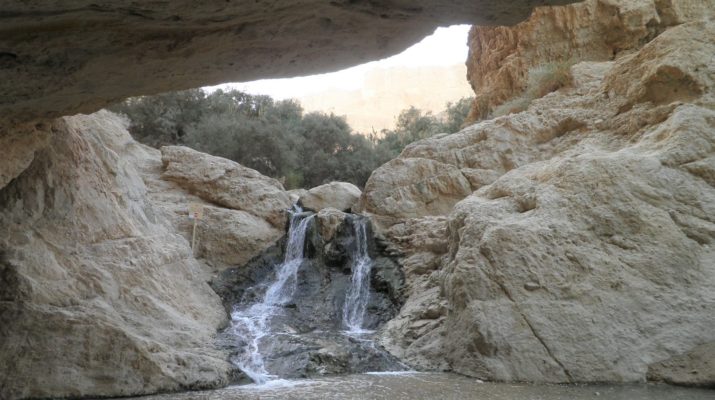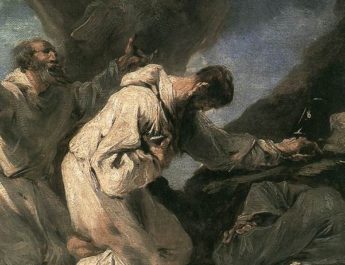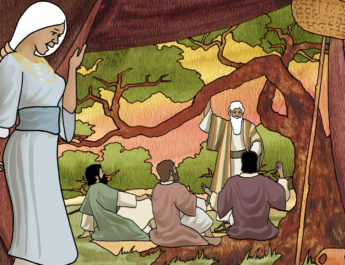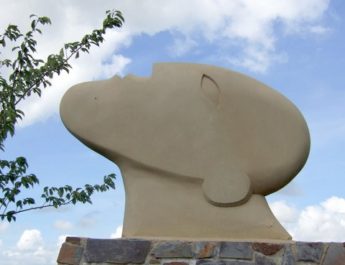Isaiah 43:16-21
Lent C19
16 Thus says the Lord,A
who makesB a wayC in the sea,D
A “Lord” = YHVH. From havah (to be, become) or hayah (to come to pass, become, be). This is the name of the God of Israel, the self-existent and eternal one, the tetragrammaton. This pronunciation has been lost to time so “Lord” is generally used in its place.
B “makes” = natan. This is to give, put, set, offer. It is to give literally or figuratively.
C “way” = derek. From darak (to tread, march, to walk. Can also mean affixing a string to a box since one needs to step on it to bend it in the process; so also an archer). This is a road as a thing that is walked on. Can be used figuratively for the path that one’s life takes or how one chooses to live one’s life.
D “sea” = yam. Root may mean to roar. This is the sea, often referring to the Mediterranean. It comes from the root in the sense of the roar of crashing surf. This word is sometimes used for rivers or other sources of water. It can mean to the west or to the south.
a pathE in the mightyF waters,G
E “path” = nathiyb. Root may mean to tramp. This is a path beaten from regular use. So, it is pathway or traveler.
F “mighty” = az. From azaz (to be strong, become fixed, be bold, prevail, be impudent; it means to be stout literally or figuratively; a Late Hebrew word). This is strong or mighty. It can also refer to power or vehemence or mean greedy.
G “waters” = mayim. This is water, waters, or waterway in a general sense. Figuratively, it can also mean juice, urine, or semen.
17 who brings outH chariotI and horse,J
armyK and warrior;L
H “brings out” = yatsa. This is to go or come out, bring forth, appear. It is to go out in a literal or figurative sense.
I “chariot” = rekeb. From rakab (to ride an animal or in some vehicle; also, bringing on a horse). This is a vehicle, wagon, or chariot. It can be cavalry or an individual rider.
J “horse” = sus. Root may mean to skip as in jump for joy. This is a crane or a swift bird. It is also a horse as leaping.
K “army” = chayil. From chul (to be firm, strong, prosperous; to endure). This is strength, wealth, ability, activity. It can refer to soldier or a company of soldiers as well as goods. It is a force of people, means, or goods. It can speak of valor, virtue, or strength.
L “warrior” = izzuz. Related to “mighty” in v16. 2x in OT. From azaz (see note F above). This is mighty, forcible, an army, strong.
Mthey lie down,N they cannotO rise,P
they are extinguished,Q quenchedR like a wick:S
M {untranslated} = yachad. From yachad (to join, be united). This is a unit, both, altogether, unitedness, alike.
N “lie down” = shakab. This is to lie down, lodge. It is lying for sleep, sex, or other reasons.
O “cannot” = bal. From balah (to grow old, wear out, consume, waste, enjoy, fail, decay). This is not, lest, neither. Properly, it refers to a failure, so it implies nothing or not at all.
P “rise” = qum. To arise, stand, accomplish, establish, abide. This is rising as in rising against, getting up after being sick or asleep, arising from one state to another, becoming powerful, or rising for action. It can also be standing in a figurative sense.
Q “extinguished” = daak. 9x in OT. This is to go out, quench, dry up.
R “quenched” = kabah. This is to quench or extinguish. It could refer to a fire or to anger.
S “wick” = pishtah. 4x in OT. From peshet (flax, linen); from the same as pash (extremity, continuing). This is flax, which may refer to a wick.
18 Do not rememberT the former things,U
or considerV the things of old.W
T “remember” = zakar. This is to remember, to mark something so that it can be recalled, to be mindful of, to mention.
U “former things” = rishon. From rishah (beginning or early time); from rosh (head, captain, or chief; excellent or the forefront; first in position or in statue or in time). This is first, former, ancestor, beginning, ranked first.
V “consider” = bin. This is to discern, consider, attend to. It refers to distinguishing things in one’s mind or, more generally, to understand.
W “things of old” = qadmoni. 10x in OT. From qadmon (eastern); from the same as qedem (front, formerly, before, east, eternal, everlasting, antiquity); from qadam (to come in front or be in front; to meet, anticipate, confront, receive, or rise; sometimes to meet for help). This is former or eastern.
19 XI am about to doY a new thing;Z
now it springs forth,AA do you not perceiveBB it?
X {untranslated} = hen. This is a remark of surprise or excitement: lo! Behold! It can also mean if or though.
Y “do” = asah. This is to make, do, act, appoint, become in many senses.
Z “new thing” = chadash. From chadash (to renew or restore, to repair or rebuild). This is something fresh or new.
AA “springs forth” = tsamach. This is to sprout, grow, or spring up – literal or figurative.
BB “perceive” = yada. This is to know, acknowledge, advise, answer, be aware, be acquainted with. Properly, this is to figure something out by seeing. It includes ideas of observation, recognition, and care about something. It can be used causatively for instruction, designation, and punishment.
I will makeCC a way in the wildernessDD
and riversEE in the desert.FF
CC “make” = sim. This is to put or place in a literal or figurative sense. It can be appoint, care, change, make, and may other things.
DD “wilderness” = midbar. From dabar (to speak, command, declare). This is mouth or speech. It can also be desert or wilderness. Additionally, it can be used for a pasture to which one drives cattle.
EE “rivers” = nahar. From nahar (to flow, sparkle, be cheerful). This is a stream, river, or flood. Particularly used for the Nile or Euphrates. Figuratively, this can mean prosperity.
FF “desert” = yeshimon. 13x in OT. From yasham (to be stripped, destroyed, desolate). This is a wilderness or desert. It can also refer to a place called Jeshimon. It means “wasteland” or “wilderness.” See https://www.abarim-publications.com/Meaning/Jeshimon.html
20 The wildGG animalsHH will honorII me,
GG “wild” = sadeh. This is literally field, ground, soil, or land. It can be used to mean wild like a wild animal.
HH “animals” = chay. From chayah (to live or keep alive literally or figuratively). This is alive, living, lifetime. It can also be used to describe someone’s age. It can refer to animals, plants, water, or a company or congregation of people. It is life in a very broad sense.
II “honor” = kabad. To be heavy, weighty, or severe. It can also be positive abounding in, rich, or honorable. The Hebrew word for “glory,” kabod, is taken from this root.
the jackalsJJ andKK the ostriches;LL
for I giveMM water in the wilderness,
rivers in the desert,
JJ “jackals” = tannin. From the same as tan (jackal, dragon, whale). It may stem from a root meaning elongate. It is some kind of monster of land or sea like a jackal or a sea serpent.
KK {untranslated} = bat. From ben (son literal or figurative; also, grandson, subject, nation); from banah (to build or obtain children). This is daughter in a literal or figurative sense.
LL “ostriches” = yaanah. 8x in OT– 4x as figures of wilderness or desolation, 2x to say they are not clean for eating, and 2x as part of God’s creation that honors God and laments destruction. Perhaps from anah (to testify, sing, respond). This is greed, ostrich, or owl.
MM “give” = natan. Same as “makes” in v16. See note B above.
to give drinkNN to my chosenOO people,PP
NN “give drink” = shaqah. This is to give water to, to cause to drink – to irrigate, drown. It can be used for watering plants or giving water to flocks.
OO “chosen” = bachir. From bachar (to choose, appoint, try, excellent). This is chosen or choice. So, it implies excellence.
PP “people” = am. From amam (to darken, hide, associate; creating shadows by huddling together). This is people or nation. It can be used specifically for a tribe, collectively of troops or armies, or figuratively to refer to a flock of animals.
21 the people whom I formedQQ for myself
so that they might declareRR my praise.SS
QQ “formed” = yatsar. Perhaps related to yatsar (to be narrow, distressed, or vexed); perhaps related to tsarar (to bind, restrict, narrow, be cramped, an adversary). This is to fashion or form, perhaps by squeezing something into a shape or form. Particularly, it is to create as a potter does. Figuratively, it is to determine.
RR “declare” = saphar. From sepher (writing, document, book, evidence). This is properly to tally or record something. It can be enumerate, recount, number, celebrate, or declare.
SS “praise” = tehillah. From halal (to praise, be boastful). This is praise or a song of praise. It is to offer God a hymn, to boast in God. This shares a root with “hallelujah.”
Image credit: “The Bokek spring and Bokek stream in the Arava desert of Israel” by dan barbarian, 2011.




